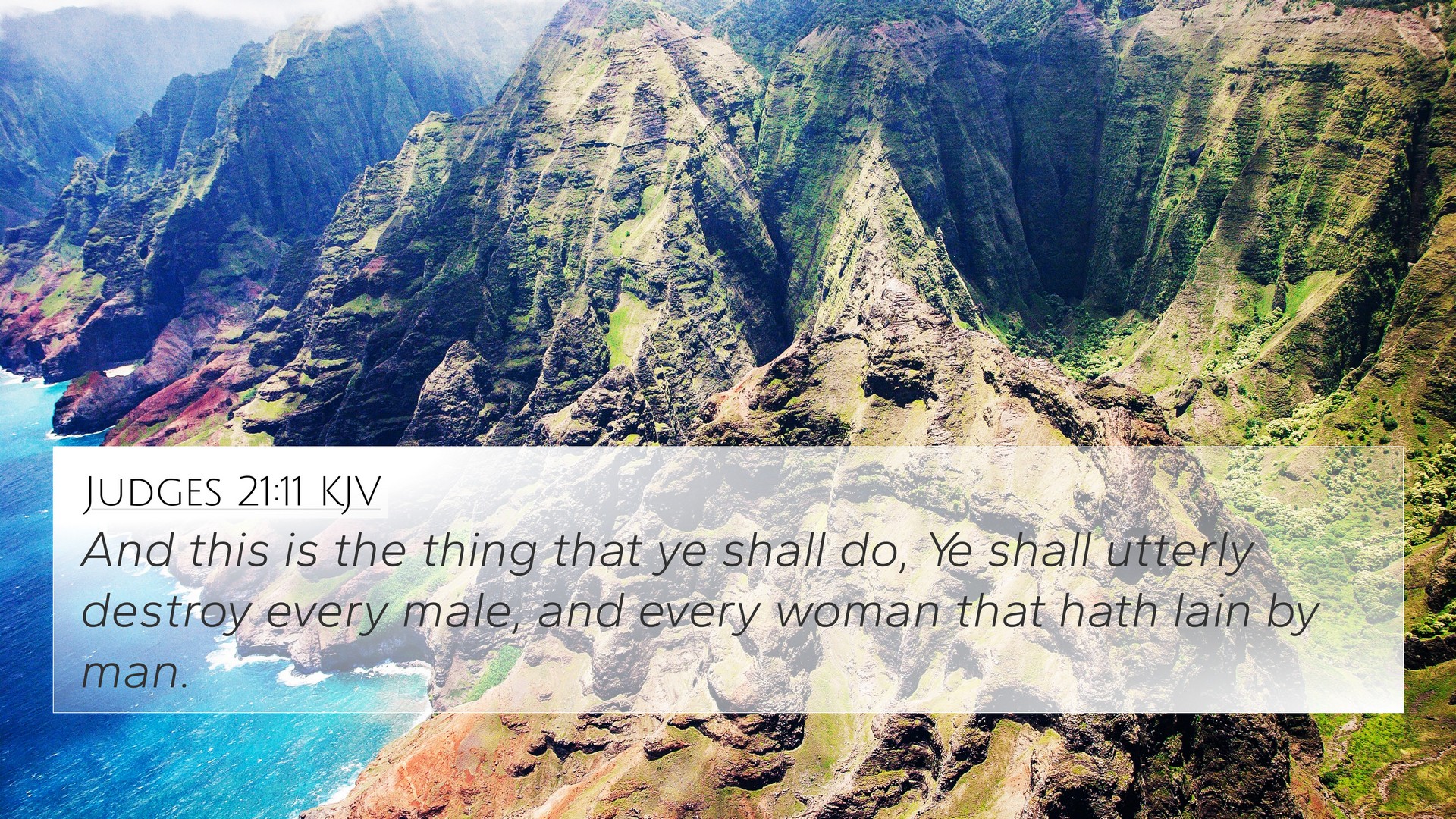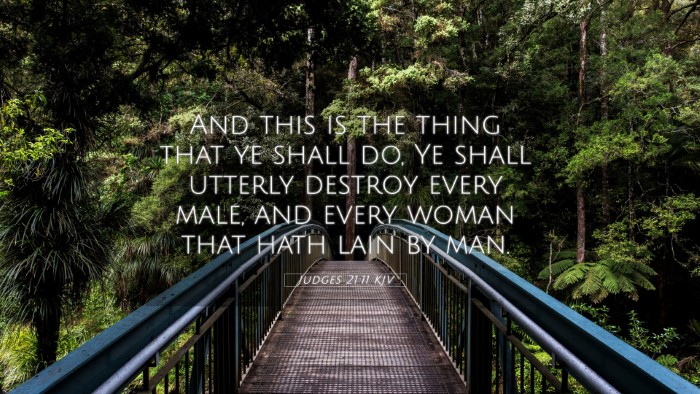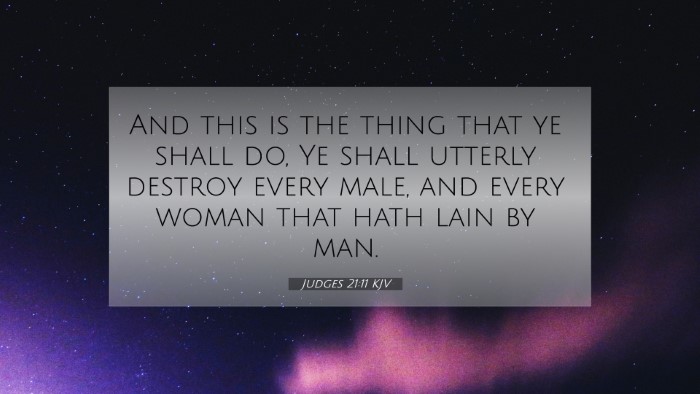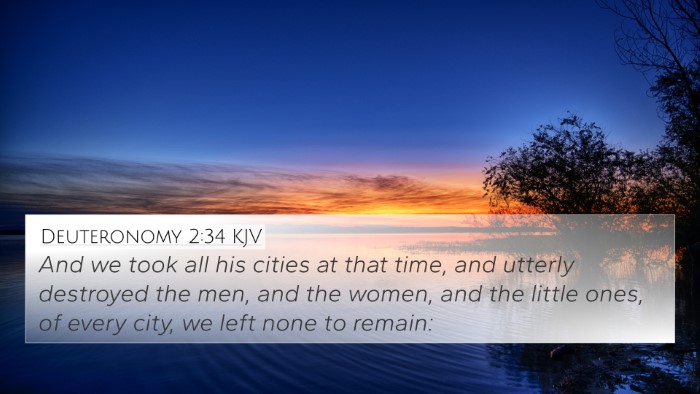Understanding Judges 21:11
Judges 21:11 provides a significant moment in the post-war context of Israel’s history, specifically addressing the aftermath of a brutal internal conflict and the need for restoration within the community. This verse states, "And this is the thing that ye shall do: Ye shall utterly destroy every male and every woman that hath lain by man." It signifies an extreme measure taken to resolve the issue arising from Benjamin's actions and the plight of the other Israelite tribes.
Verse Context and Significance
The overarching narrative leading to this moment reflects on the moral and social turmoil within Israel during the time of the judges. The internal conflict described in the book reveals Israel’s deviation from God's ways and the ensuing chaos. Matthew Henry emphasizes the gravity of the situation, suggesting that the drastic measures were meant to purge the evil from Israel and prevent further transgressions against divine law.
Analysis and Themes
In this chapter, we see themes of restoration, identity, and redemption. The brutal resolution called for in Judges 21:11 is indicative of the lengths to which Israel would go to maintain its covenantal identity and integrity as a people chosen by God. The decision to destroy the remaining inhabitants of Jabesh-gilead demonstrates not only a commitment to purity but also raises questions about mercy and justice in biblical law.
- Divine Judgment: The act of destruction symbolizes God's judgment on sin, reflecting a common biblical theme where divine retribution is enacted as a means of preserving the covenant community (see Deuteronomy 13:12-16).
- Community Responsibility: The collective action of the Israelites in executing the command illustrates the weight of communal responsibility in upholding God’s standards (see Ezekiel 3:18).
- Human Agency and Divine Will: This verse presents a unique interplay between God's sovereignty and human action, reminiscent of the discussions present in Proverbs 16:9 regarding the planning of man and the direction of the Lord.
Bible Cross-References
Here are some relevant Bible verses that can be cross-referenced with Judges 21:11:
- Deuteronomy 13:12-16 - God’s commands for dealing with idolatry in cities.
- 1 Samuel 15:3 - Saul's command to destroy Amalek showcases similar themes of divine judgment.
- Joshua 6:21 - The destruction of Jericho as a judgment against sin.
- Romans 6:23 - The wages of sin articulate the seriousness of divine justice.
- Hebrews 10:31 - The fearful consideration of falling into the hands of the living God.
- Luke 14:26 - The call to prioritize God above all, paralleling the demands of community purity.
- 2 Corinthians 6:17 - The call to separate from unclean things, similar to the removal of wickedness in Israel.
Linking Themes and Interpretations
Judges 21:11 serves as a gateway to broader discussions about communal purity, divine judgment, and the ethical imperatives derived from God's laws.
When interpreting the verse, it is essential to consider how it links with other passages throughout Scripture, creating a web of thematic connections. Matthew Henry asserts that every judgment by God is also a call for repentance, urging readers to recognize the severity of disobedience while also reflecting on God's mercy in the covenant.
Cross-Referencing Tools
For those interested in exploring these themes further, various tools for Bible cross-referencing can help deepen the understanding of similar biblical texts:
- Bible Concordance - Helps locate verses quickly.
- Bible Cross-Reference Guide - Offers insights into interconnected verses.
- Cross-Reference Bible Study - A method to study commonly linked passages.
Conclusion
In conclusion, Judges 21:11 intricately weaves a narrative that challenges readers to confront the serious implications of sin and divine justice. The call for judgment upon entire communities emphasizes the sanctity of God's covenant, while also inviting reflection on the balance between justice and mercy in biblical theology. The extensive web of cross-references throughout Scripture uniquely positions this verse within the broader themes of God's redemptive plan, urging believers to engage with the text not only for historical understanding but also for its present-day implications.




